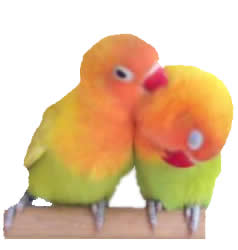
_The Lovebird Farm
Birds for Sale
Equipment
Other Info.
Care Tips
Lovebirds are quite hardy but they do require some basic bird care. The following are some basic guidelines we practice to ensure our birds remain happy and healthy.
Food and Water
Always ensure your lovebird has fresh clean water to drink. They also like to have a bath every now and then, so it is also a good idea to provide enough water for them bathe. Always ensure your lovebird has plenty of seed, a small parrot mix is fine; we use Avigrain peachface mix. As bird seed alone is not a nutritionally complete diet for lovebirds, we suggest you supplement their diet with fresh apple (avoid apple seeds), broccoli, endive, carrot, corn, and celery at least twice a week or ideally every day. Be sure to wash fruit and vegetables prior to feeding and remove any that have fouled. Lovebirds also require a good source of calcium. This can be supplemented by placing cuttlefish bone in your bird’s cage.
Health
The key to a healthy lovebird is prevention. Stress is likely a large contributing factor in the onset of many bird illnesses, so it is always best to try to keep your lovebird happy and stress free. This can be achieved by ensuring your bird:
(a) receives fresh food and water
(b) is wormed ideally every three months (particularly if kept outdoors or if in contact with wild or other birds)
(c) is happy living with any other birds in his/her cage
(d) is not overcrowded in their cage
(e) is not exposed to toxic fumes
(f) receives some natural sunlight for vitamin D production
(g) has some shelter from direct sunlight and rain
(h) has a section in their cage where they feel safe (this can be achieved by placing their cage in a corner, purchasing a bird hut, or nest box)
(i) has room to fly
Signs of illness include prolonged fluffed feathers, nasal discharge, watery eyes, weight loss, trembling, and lethargic behaviour. If your lovebird is experiencing any of these symptoms, it is best to take your lovebird to an avian vet as soon as possible and keep it warm in the meantime.
Birds can often hide signs of illness and therefore it may be difficult to tell if your lovebird is unwell. They can also often be carriers of disease, meaning that they may carry a disease yet not show any detectable signs of illness. It is therefore recommended to quarantine all newly acquired lovebirds for at least 40 days prior to introducing them into cages/aviaries with other birds.